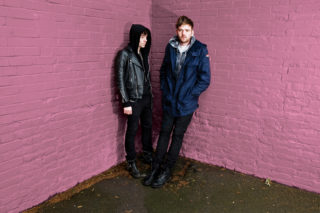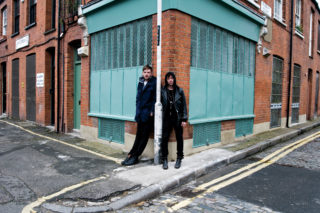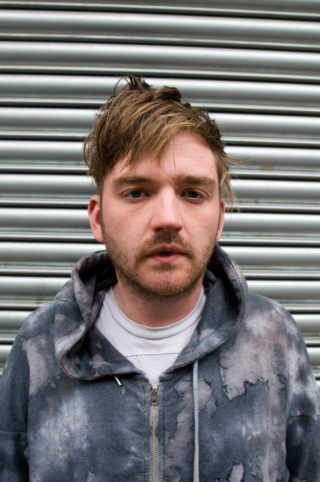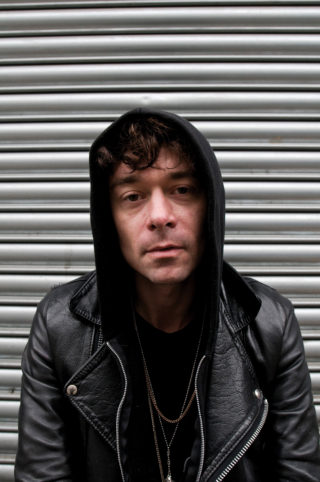The Big Pink have now interest in making lo-fi indie – they’re about building walls of sound
Size matters

Size matters
Sorry to bang on about the new Horrors record for the second month in a row but 1. it’s really good and 2. it’s fast becoming a shorthand reference for the unfolding story of 2009: out once and for all with plug-in-and-play guitars and inconsequential rambles about what happened in the pub last night; in with big, mythic themes, gliding riffs and soaring electronic sequences. The ambiguous gloomy, gaze-y tags aside, the current appetite is for challenging, danceable rock and roll. Milo Cordell [sat on the left] signed the Universal-dumped garage rockers to XL for that huge follow up, and if ‘Primary Colours’ is the zeitgeist’s flagship album, he and singer/guitarist Robbie Furze [the one on the right, obviously] are sure to be its pin-ups.
Their past forays into the music industry – Milo founded Merok Records in 2006, Robbie played with Alec Empire, they both ran an industrial label called Hate Channel – make them a very well connected band and this has been linked, not altogether wrongly, with The Big Pink’s quick climb into the public’s conscious. Blogs have been ranting about them for ages and, after two singles (the latest for the consistently super 4AD), the mainstream media has started to follow suit. Talking about signing Faris and Co., Milo could be describing a trip, albeit an exciting one, to the supermarket – “I went to their second show at Brixton Windmill and I can remember not liking them,” he says. “Then I saw them again somewhere else and thought they were amazing. I knew them from out and about and realised from talking to them that they had so much more to offer and that it was going to be something really different.”
Business seems to come second nature to them, but The Big Pink are a band in their own right, and this project has entirely taken over their schedule.
“There’s no fucking rest for us,” says Milo. “We’re shooting the video for ‘Stop the World’ tomorrow, then we’re off to Europe for four shows. After the ICA we partied all night so we didn’t sleep on the Saturday, the Friday…”
“We didn’t sleep ‘til last night,” Robbie chimes in, looking as though he’d sink through the floor if he closed his eyes for longer than a blink. As for Merok, Milo confesses, “I just can’t do it anymore, I mean, I do it from afar. I’ve got one guy who pretty much runs it all now, looks after everything.”
Robbie: “We don’t have any time to do anything else, it’s just this.”
In a Brick Lane bar, I’d been trying to get them to talk about their blistering set at the Electric Ballroom on the first day of the Camden Crawl. Clearly the whole weekend has been something of a blur for them but for those of us in the audience who can remember, the gig was a great half hour that deserved more singing along and fewer media eyebrows. Intense Throbbing Gristle-meets-Psychocandy beatscapes held hands with a rush of noise, floating vocals and huge choruses, seamlessly sewn together and accompanied with smoke, acid-test strobes and lights. The consensus in the Loud And Quiet camp was that they needed a few more big tunes in the set (like the brilliant ‘Dominoes’), hopefully in time for the summer’s festival circuit, but they made up the deficit with a choreographic confidence – found elsewhere in their song structures and press shots – that comes in part from their music biz know-how.
“Oh yeah, that was good.” A fragment of the night comes back to Milo. “It’s because we control it, if you don’t control it you lose the translation. This is what I learnt from having a record label, I learnt that music isn’t just music, it is about what you look like, it is about what shoes you wear, not as in you’ve got to be this brand, but it’s about how you’ve created yourself. It’s the same with the artwork, same with the photos. All the best bands keep an ear and an eye out for that kind of thing. Like the light show, we do it all ourselves on-stage with pedals. If we didn’t control it ourselves it would be some tosser making us look like a Christmas tree, know what I mean? Even if it’s like, ‘I want a spinning white thing, put it by the drum kit’, some guy gets a spinning white thing and puts it by the drum kit. It’s really easy. We do enjoy it when we see pictures of the show and we’ve got our lights and smoke and stuff, it looks good, it’s part of the whole thing. We’re creating every angle of what we’re trying to do and people notice it – like ‘hold on, they’ve got cool press shots.’ Everyone could have cool press shots if they just have a little bit of imagination or enough balls to be like, ‘I don’t want to do it like that, I want to do it like this.”’
It’s experience and artistic drive speaking, rather than cynicism, and as the conversation hops between their previous and current endeavours it’s obvious that the beliefs they now hold as a band have grown organically from their time spent playing a backstage role in the careers of other acts; acts such as Alec Empire, who Robbie remembers fondly: “I played with him for the ‘Intelligent Sacrifice’ tour, which went on for about 18 months. That was 2004 I think, then I did my own band on his label. We did a few one-off shows with him a couple of years ago. Panic DHH it was called. Industrial band, yeah.”
The first signing of note for Milo – and indeed the beginning of Merok – was Klaxons.
“I’d always wanted to do it and Robbie was away for quite a long time, we’d done our own label before that and I guess I just wanted to start a label. I saw Klaxons play and I was like okay they’re a brilliant band to kick it all off with. We all got on really well and ended up living together, doing all these really fun parties and throwing all these raves. Then we did a couple of releases, they got signed to Polydor and it just kind of carried on.”

Carrying on involved signing the likes of Rainbow Arabia, Teengirl Fantasy, and Salem. These ace, digital-hearted bands reflect Milo’s interest in electronic music and showing itself within other areas of The Big Pink’s sound is the collective influence of their previous industrial engagements. Also explicitly present are the channelled spirits of Mary Chain and My Bloody Valentine. The two went together to see Kevin Shields’ reformed dream pop gods at the end of last summer. But seeing those Roundhouse shows wasn’t an experience as formative for them, and London bands in general, as you’d think.
“That was only at the end of last year and we’ve been doing this for a lot longer than that,” argues Robbie “but I think what it probably did was get people, journalists, thinking about it and talking about it in some way. I don’t think The Horrors or us sound like MBV but what people are referencing might be Kevin Shields’ production, just that big guitar sound.”
In this vein of thought, they discuss catching Sonic Youth at Shepherd’s Bush Empire and a rare London performance of Glenn Branca’s guitar orchestra on Southbank.
“I went to see them, like a thousand guitars,” recalls Robbie. “Yeah a thousand, no a hundred I think. It was good but I thought they could’ve done better with the guitarists they’d picked. There were a lot of shit people playing guitar at that.”
“They didn’t do a good casting session?” Milo suggests.
“Yeah, there were a lot of geeky guitarists, like it didn’t feel… it didn’t look great. It sounded really cool and it was amazing to watch but it wasn’t like, ‘I was there and I saw…’ Lots of guys were looking at each other, going… [mimes spoddy guitarists]. It just wasn’t a lot of cool people playing guitar. What really inspired us when we first started making noise was, playing with Alec Empire, we used to do these improvised noise pieces at the end of the show and actually there was a thing that, because you were letting go of what you were playing (you were just making sounds with the effects you had), you kind of took on the ambience of the room and the reaction, so if it was a really aggressive show or an aggressive crowd the noise would be aggressive. It would organically affect the sound of the noise.”
“Yeah,” says Milo, “it starts talking to you in the end, little voices. I definitely started hearing little voices at My Bloody Valentine.
“It’s different from being constrained by any sort of chords, you let go of all that and just feel the moment, which is what we do. If you’re feeling sad that’ll sometimes come out in the noise but if you’re feeling mellow it’ll have this more spacey feel to it. You see it after a while, it’s amazing to watch.”
The Big Pink have said before that feeling noise can only go so far and that they see what they are doing as a chance to push further with melody and structure, but noisy walls of sound remain a fundamental element of what they write and rumours are rife that a collaboration with Shields himself is on the cards.
“I’d love to work with him,” says Milo “someone was trying to get him to do a remix for us but I don’t know, I think he’s a pretty difficult person to tie down. There are always talks because our agent used to manage Primal Scream – the one they fired when they got ripped off by their accountant – and then all the people that work there used to work at Creation Records. It’s really weird, we’ve dipped into this world: our tour manager used to go out with Lydia Lunch and was in a band that was signed to 4AD, and his wife sang backing vocals on ‘Just Like Honey’ and used to take heroin with The Birthday party.”
“Yeah, we’ve kind of been thrown into this amazing world of English music,” laughs Robbie.
That network continues to pass on influence to and participate in the band with legendary shoegaze producer Alan Moulder mixing their latest single, ‘Velvet’; without doubt the band’s best track to date. “That song really condenses a lot of our record collection in just over three minutes” explains Milo. “It kind of dips into history and picks up on quite a lot of the music that we love, whether it’s soul music, industrial, Phil Spector’s Wall of Sound, Kevin Shields’ Wall of Sound and kind of Hip Hop in a way as well I think.”
These ears were and continue to be eluded by that particular genre’s presence in the track but The Big Pink know their stuff, name-checking Eastside pioneers Chubb Rock, Pete Rock and C.L. Smooth as well as Glaswegian 8 bit Hip-Hopper Hudson Mohawke, and have proved themselves more than capable of fusing disparate musical sources.
“When we started we wanted to be a digital Velvet Underground,” explains Milo “That’s all we wanted to be. The same way they use violins or whatever and treat them really weirdly, we wanted to do with synths and create our own thing. Then we grew out of that. That was our first, whatever you call that word…”
Robbie: “Stepping Stone.”
Milo: “But we were talking about the best year ever for music the other day”
Robbie: “Yeah late 91, early 92.”
Milo: “Well late 91 to June 92.”
Robbie: “Those three years. 89 to 92. You’ve got Pretty Hate Machine, what else were we saying?”
Milo: “‘Nevermind’.”
Robbie: “‘Nevermind’. Got ‘Bleach’ as well.”
Milo: “And ‘92 was the best year for Hip Hop, when they started using soul samples.”
Robbie: “When was ‘Straight Outta Compton’?’
The interview winds its way through their extensive record collections (Milo’s on two thousand and counting), photographers, Kasabian, their dogs, and settles on the band’s debut LP, which is completely written. After finishing their dates in Europe, they’re flying out to Brooklyn for a month to record it and are considering a permanent move.
“We’re gonna do it ourselves,” says Milo “but in Electric Lady Studios, Jimi Hendrix’s old studio. Richard Costey’s gonna mix it, he’s a big fan. We’ve written all the songs for it but there’ll definitely be some that we haven’t played live before, at least a quarter of it. Then we’ve got a couple of really slow, not ballads but kind of slow jams, which will go on there. We’ve got a song on our Myspace called ‘A Brief History of Love’, that’ll probably go on it.”
So, why New York?
“It’s ‘cause it’s like… it’s kind of like Ribena or something.” Milo ventures forth, clutching the metaphor. “Compared to here, which is like Ribena in a carton, New York is Ribena in the bottle, everything there’s so concentrated.”
“You know, in ‘The Last Waltz’ by The Band,” says Robbie, “they ask ‘what is it about New York?’, and they say it’s an adult dose. It can kick your ass and you come back and heal your wounds and it kicks your arse again and you eventually fall in love with it. The speed of it is so intense. I think that’s what we like about it, that’s what I like about it. Manhattan is the craziest bit, I actually haven’t spent much time in Brooklyn, which is where we’re gonna stay this time. We’re gonna have a place to stay that’s actually ours so we’ll be able to come back and chill out a bit. Before it was just staying on people’s floors and sofas and stuff, so you’re always kind of up. It’s quite hardcore there.”


That’s not to slight London though, which they say has been instrumental to their creative process. “Where our studio is where we write, there’s definitely a speed to it,” ponders Milo. “We very rarely have any songs that we don’t want to use, they come very quickly and it’s an amazing feeling. There are no egos involved so we don’t argue about anything. Pretty much a whole song will get done in about two days.”
“It’s just us two,” adds Robbie “Milo and me. It’s the combination of him and me in a room together and then it all just happens. Also, the whole record has pretty much been written whilst hung-over.”
Milo: “After a party or something. After some kind of…”
Robbie: “’Experience’…”
Milo: “Whether it be psychedelic or romantic or whatever. I think maybe the reason people like our music is it’s not just the lyrics or the actual song which can evoke a feeling – like when someone writes a song because they’ve just fallen in love or something – it’s like that, but I think we can do that by manipulating noise, like creating a synth noise that can evoke that emotion too.”
Which parties have made for the most creative hangovers?
“The last ones we’ve been to are those Horrors club nights, The Cave,” says Milo. “I’m not all into that… what’s that place that everyone goes to in the west end? Uh… Bungalow 8. We don’t go to any of those kinds of places. I’ve only been there once, it was like £8 for a beer, that was my main fucking problem.”
“And it’s Shit,” offers Robbie. “I don’t really understand why people want to go there.”
“It’s not really our thing,” continues Milo. “I mean, I’ll happily go to those things but that’s not where we really make ourselves regulars. We don’t really make ourselves regular anywhere. We’re irregular. We regularly go out to wherever.”
Robbie: “There’s some reason to go to Bungalow 8, we just don’t know it yet.”
Milo: “Ha! There’s some secret room where beers are only three quid.”
Robbie: “We go to my house or his house. Well, I say that but I know I’ve been out, I just can’t remember where. Just shows I guess.”
Milo: “Yeah people usually end up at our house, maybe they go to Bungalow 8, get bored, then come back to our house.”
As for their own shows, it’s impressive how well their quickly penned studio creations survive the transfer into live renditions. One thing to come out of the Camden Crawl was a nauseating over-familiarity with bands reliant on backing-tracks. It’s a habit that the drum machine-favouring Big Pink could’ve easily slipped into.
“It’s a way of doing it,” says Robbie, “but it’s so rigid. You’re stuck to this very start-stop thing and you can’t break out of it. We didn’t want to do that, we wanted to make sure it’s different every time we play. It’s never the same ‘cause Milo’s affecting the samples live, all my guitar stuff’s always different. All the noisy stuff that you hear, that’s just me and Milo, it’s either guitar sounds or samples or beats. We do most of the work, the drums and bass kind of fit in with it. But we work with such great people that it’s really easy. Leo, who plays bass, didn’t know he was coming to do this last tour till three days before and we just sent him all the songs and he just listened to it on his iPod on the way here and by the time he got here on this 12 hour plane journey he knew how to play it. Same with Kiko, our drummer.”
I tell the band how the last time I saw her she was in her role as singer for Pre, rolling around on the floor of Hoxton bar, extracting a tampon.
“Sounds about right,” laughs Robbies. “Luckily she’s toned it down a bit for us, but we did let her drum in her bra the other night, which she hasn’t done before.”
“They just spent more time looking at her than at my keyboard,” says Milo.
Casually ironic about the limelight, it’s obvious that right now, these two are enjoying their moment.
“Robbie’s the frontman, he sings,” says Milo “I know that and I know my position and he knows, but he’s not…”
“…I haven’t got the ego runway yet, maybe someday.”
Milo: “As for being stars or getting reps for anything other than what we do, we couldn’t give a shit about that.”